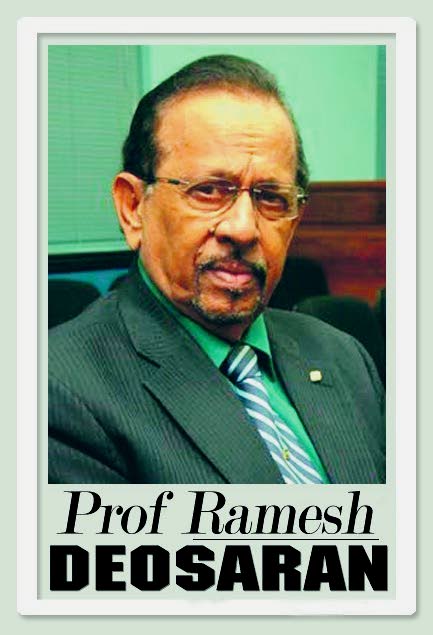Presidential politics

By Professor Ramesh Deosaran
This is a story of two presidents. One, desperately fighting to save his political career by any means possible; the other, courageously pleading, with all the risks involved, for a better life for our citizens.
First, the US President. Last Wednesday became the day the moral stature and international reputation of the US White House collapsed under the subversive tactics and demagoguery of 74-year-old outgoing President Donald Trump. Having lost to Democrat Joe Biden by 232 to 306 electoral votes in last November's elections, last Wednesday he defiantly declared to his “Make America Great Again” supporters: “We will not give up, we will never concede.”
Pelting out a questionable bunch of election statistics, he claimed, “They stole the election from us.” Like a perpetual narcissist and full-bred megalomaniac, the US$3.1 billionaire-rich businessman-turned politician claimed “more than 18,000 were allowed to vote in Pennsylvania after election day, over 10,000 votes in Georgia belonged to dead people, 174,000 voted in Michigan but no names found,” etc. His crowd clapped and with mob psychology in full gear, they apparently forgot that the Appeal and Supreme Court judges whom he had appointed had already rejected such claims of “election fraud.”
With vengeful chaos, they marched against the Capitol Building – that majestic symbol of American democracy – smashing windows, sending legislators scampering, occupying the offices of senior US legislators. Security, preventive and reactive, broke down. All so shocking, humiliating and unprecedented that even some of Trump’s strongest supporters, including his Vice President Mike Spence and House Leader Mitch McConnell, deserted him and his “election fraud” propaganda.
Trump’s “no surrender” strategy backfired. American democracy is still standing. Biden will be sworn in on January 20 as the 46th US President, leaving behind a warning: Beware of narcissists and public buffoons who seduce the media into providing an everyday circus instead of demanding firm accountability and required performance.
With unprecedented courage and compassion, our President, 62-year-old Paula-Mae Weekes, in her New Year message listed numerous ways in which our citizens endure daily suffering, “from the perennial issues of crime, racism and joblessness, to the new challenges on the block – illegal immigration, stranded abroad and closure of business.”
She added: “While the government of the day may well have some of these matters in its sight, those in the kitchen are feeling the heat daily and are not sympathetic to hackneyed excuses, promises of action and sob stories of doing one’s best, which they have heard ad nauseam, with nothing to show for it.”
Many citizens’ letters and public voices of relief and agreement have appealed to her. At last, it appeared that someone high up there understood and faithfully represented their daily pain and suffering. She must not appear to stand alone. Too many have remained kicked around for “talking turkey,” that is, for publicly voicing concerns about the un-attended degradations of our public life.
Seemingly aware of how high up the inefficiency and non-responsiveness exist with immunity, President Weekes advised: “Public officials have to stop being so secretive (except for national security), paranoid, and dismissive of the anxieties of our citizens. Those in authority must, like Caesar’s wife, be above suspicions and reproach in all their dealings.”
Last year, she bluntly asked politicians: “Can we trust you?”
Their response is yet to come. Politicians here seem to survive more by legalisms than by inspiring ethical conduct.
Will her warnings be heard? A word to the wise, Madam President said. I also think it’s time for the president to reserve some kind of oversight over the “independent” persons he or she appoints and then re-appoints. Much of the immunised inefficiency and non-responsiveness happens up there in the expensive Service Commissions, Ombudsman, etc. Given the records, the Ombudsman’s role needs review. The president, notwithstanding “constitutional limitations and conventional restrictions,” must also provide some action to her good advice. There is space to do so at least in careful recruitment and re-appointments.
President Weekes’ compassionate appeal is not for noisy marches to Parliament but for high-up reflection, obedience to oath of office and good conscience. It is yet another attempt to prove that the pen is still mightier than the sword.
One president failed to demonstrate this. The other, our own, rose to the occasion.

Comments
"Presidential politics"